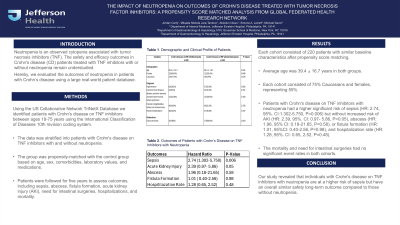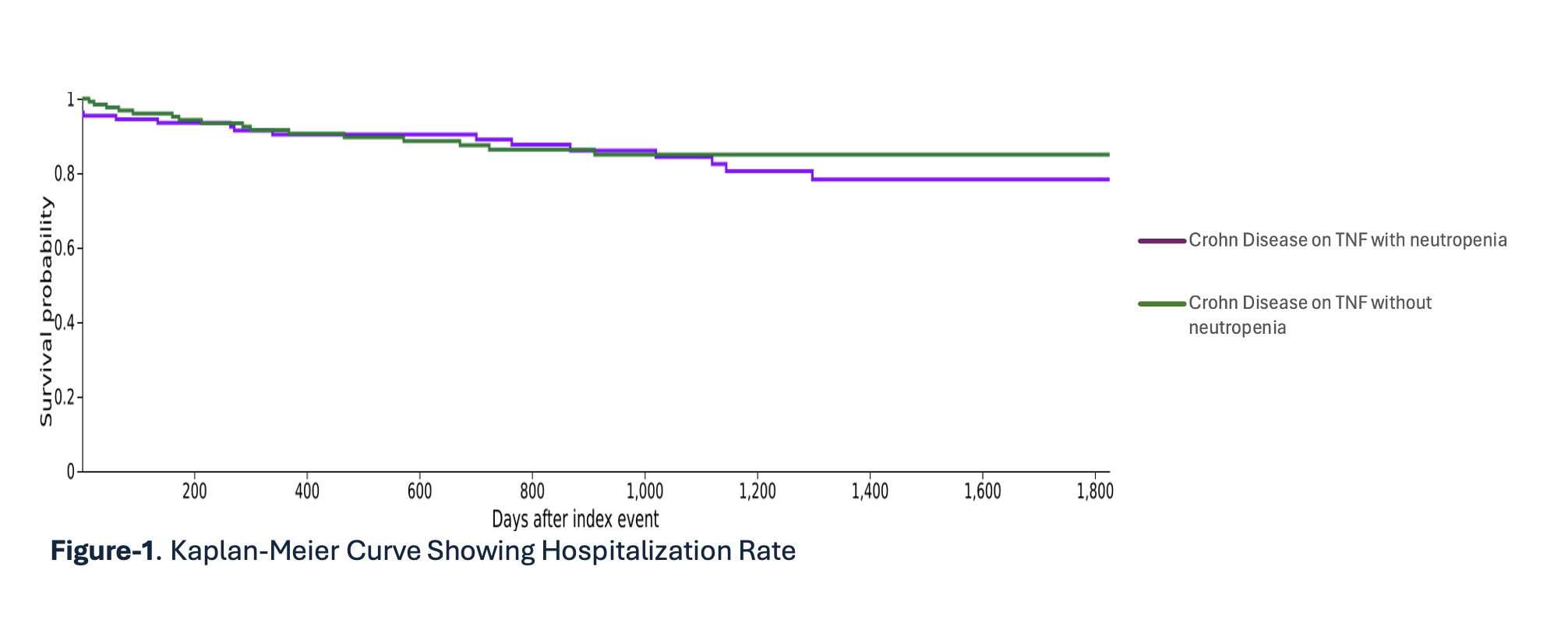Tuesday Poster Session
Category: IBD
P4300 - The Impact of Neutropenia on Outcomes of Crohn’s Disease Treated With Tumor Necrosis Factor Inhibitors: A Propensity Score Matched Analysis from Global Federated Health Research Network
Tuesday, October 29, 2024
10:30 AM - 4:00 PM ET
Location: Exhibit Hall E

Has Audio

Jordan Carty, MD
Albert Einstein Medical Center
Philadelphia, PA
Presenting Author(s)
Jordan Carty, MD1, Mikaela Nikkola Jara-Tantoco, MD1, Abiodun Idowu, MD2, Simone A. Jarrett, MBBS1, James Walter, MD3
1Albert Einstein Medical Center, Philadelphia, PA; 2Jefferson Einstein Hospital, Philadelphia, PA; 3Einstein Healthcare Network, Philadelphia, PA
Introduction: Neutropenia is an observed cytopenia associated with tumor necrosis inhibitors (TNF). The safety and efficacy outcomes in Crohn's disease (CD) patients treated with TNF inhibitors with or without neutropenia remain understudied. Hereby, we evaluated the outcomes of neutropenia in patients with Crohn’s disease using a large real-world patient database.
Methods: A retrospective cohort study was conducted using the US Collaborative Network TriNetX database. We analyzed patients between the ages of 18 to 75. Patients with Crohn's disease on TNF inhibitors with neutropenia were identified and compared to those with Crohn's disease on TNF inhibitors without neutropenia after a 1:1 nearest-neighbor propensity matching based on age, sex, comorbidities, laboratory values, and medications. Patients were followed for five years to assess outcomes, including sepsis, abscess, fistula formation, acute kidney injury (AKI), need for intestinal surgeries, hospitalizations, and mortality.
Results: There are 220 patients with an average age of 39.4 ± 16.7 years, females (55%) and Caucasians (75%) matched to each cohort. We found that within five years, patients with Crohn's disease on TNF inhibitors with neutropenia had a higher significant risk of sepsis (HR: 2.74, 95%. CI:1.302-5.750, P=0.006) but without increased risk of AKI (HR: 2.39, 95%. CI: 0.97- 5.86, P=0.05), abscess (HR: 1.96, 95% CI: 0.18-21.65, P=0.58), or fistula formation (HR: 1.01, 95%CI: 0.40-2.56, P=0.98), and hospitalization rate (HR: 1.28, 95%. CI: 0.65, 2.52, P=0.48) (See Figure 1). The mortality and need for intestinal surgeries had no significant event rates in both cohorts.
Discussion: Our study revealed that individuals with Crohn's disease on TNF inhibitors with neutropenia are at a higher risk of sepsis but have an overall similar safety long-term outcome compared to those without neutropenia.

Disclosures:
Jordan Carty, MD1, Mikaela Nikkola Jara-Tantoco, MD1, Abiodun Idowu, MD2, Simone A. Jarrett, MBBS1, James Walter, MD3. P4300 - The Impact of Neutropenia on Outcomes of Crohn’s Disease Treated With Tumor Necrosis Factor Inhibitors: A Propensity Score Matched Analysis from Global Federated Health Research Network, ACG 2024 Annual Scientific Meeting Abstracts. Philadelphia, PA: American College of Gastroenterology.
1Albert Einstein Medical Center, Philadelphia, PA; 2Jefferson Einstein Hospital, Philadelphia, PA; 3Einstein Healthcare Network, Philadelphia, PA
Introduction: Neutropenia is an observed cytopenia associated with tumor necrosis inhibitors (TNF). The safety and efficacy outcomes in Crohn's disease (CD) patients treated with TNF inhibitors with or without neutropenia remain understudied. Hereby, we evaluated the outcomes of neutropenia in patients with Crohn’s disease using a large real-world patient database.
Methods: A retrospective cohort study was conducted using the US Collaborative Network TriNetX database. We analyzed patients between the ages of 18 to 75. Patients with Crohn's disease on TNF inhibitors with neutropenia were identified and compared to those with Crohn's disease on TNF inhibitors without neutropenia after a 1:1 nearest-neighbor propensity matching based on age, sex, comorbidities, laboratory values, and medications. Patients were followed for five years to assess outcomes, including sepsis, abscess, fistula formation, acute kidney injury (AKI), need for intestinal surgeries, hospitalizations, and mortality.
Results: There are 220 patients with an average age of 39.4 ± 16.7 years, females (55%) and Caucasians (75%) matched to each cohort. We found that within five years, patients with Crohn's disease on TNF inhibitors with neutropenia had a higher significant risk of sepsis (HR: 2.74, 95%. CI:1.302-5.750, P=0.006) but without increased risk of AKI (HR: 2.39, 95%. CI: 0.97- 5.86, P=0.05), abscess (HR: 1.96, 95% CI: 0.18-21.65, P=0.58), or fistula formation (HR: 1.01, 95%CI: 0.40-2.56, P=0.98), and hospitalization rate (HR: 1.28, 95%. CI: 0.65, 2.52, P=0.48) (See Figure 1). The mortality and need for intestinal surgeries had no significant event rates in both cohorts.
Discussion: Our study revealed that individuals with Crohn's disease on TNF inhibitors with neutropenia are at a higher risk of sepsis but have an overall similar safety long-term outcome compared to those without neutropenia.

Figure: Figure 1. Kaplan-Meier Curve Showing Hospitalization Rate
Disclosures:
Jordan Carty indicated no relevant financial relationships.
Mikaela Nikkola Jara-Tantoco indicated no relevant financial relationships.
Abiodun Idowu indicated no relevant financial relationships.
Simone Jarrett indicated no relevant financial relationships.
James Walter: Eli Lilly – Advisor or Review Panel Member. Medtronic – Consultant.
Jordan Carty, MD1, Mikaela Nikkola Jara-Tantoco, MD1, Abiodun Idowu, MD2, Simone A. Jarrett, MBBS1, James Walter, MD3. P4300 - The Impact of Neutropenia on Outcomes of Crohn’s Disease Treated With Tumor Necrosis Factor Inhibitors: A Propensity Score Matched Analysis from Global Federated Health Research Network, ACG 2024 Annual Scientific Meeting Abstracts. Philadelphia, PA: American College of Gastroenterology.
